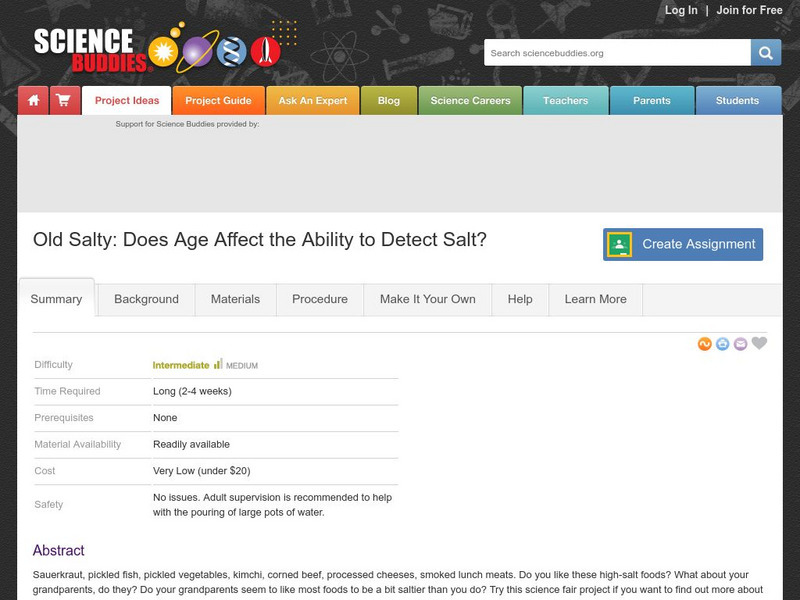Curated OER
Advanced Matching - The Organ Systems
What's the difference between the digestive system and the endocrine system? Explore 12 body systems in this anatomy matching worksheet, for which learners find descriptions corresponding to anatomical terminology. Some of the...
Prince William Network
The Incredible Journey
Divide your school gym into breeding grounds and non-breeding grounds so that your zoologists can play a game simulating the seasonal migration of shorebirds. Players pick one of the included game cards and follow its directions, which...
Curated OER
Digestion
Fourth graders answer the question what happens to the food you eat? They complete a worksheet about the food you eat. They discuss the different types of teeth that we have. Students complete digestion poster in which they color and...
Curated OER
The Five Senses
Learners recognize how each of the five senses works and define the related terminology. They compare and contrast the means by which the senses gather information about the world. In addition, they research how an assigned sense works...
Curated OER
Cells All Around
Learners measure the size of an epithelial cell and to estimate the number of epithelial cells in a given area of the body. After watching a video on cells, student groups perform an experiment using a microscope to view some of their...
Curated OER
Student Investigation on the Immune System and Hemeagglutination
Students perform an experiment to demonstrate the principles of antibody-antigen binding, the secondary immune response, cross reactivity, and complement fixation. The materials to be used include antibodies from a rabbit that was...
Curated OER
Reading Comprehension 1
What can jump 150 times its own length? Fleas! Assign this reading passage to your class, and they'll not only develop reading skills, but they'll learn about fleas. After reading the excerpt, they answer the questions that follow. All...
Curated OER
Left and Right Brains
Students research the part of the brain known as the corpus callosum. The part of the brain that connects the left and right brain, students investigate its functions and how data passes from one side to another.
Curated OER
Extremophiles- Non-Fiction Reading Comprehension
In this extremophiles non-fiction reading worksheet, students read a two page selection that describes the organisms known as extremophiles. They answer 10 questions based on the selection which include true or false, short answer, and...
Curated OER
Bugs, Bugs, Everywhere!
Young scholars collect and compare bugs using magnifying lenses and graph data based on their comparisons. In this bugs lesson plan, students also make an aspirator by using a jar, tubing, and screen.
Curated OER
Ghost in Your Genes
Learners explore DNA microarrays. In this genetics instructional activity, students model DNA microarrays that are used by scientists. Learners work to determine levels of breast cancer genes in patients. They will determine the...
Curated OER
An Exploration of Leonardo da Vinci's Life and Work
The original Renaissance man, da Vinci is a wonderful subject through which to discuss history, art and science.
Curated OER
Student Investigation on the Immune System and Hemeagglutination
Students study laboratory protocol for hemagglutination experiments.
Curated OER
Frankenstein's Monster
Students read Mary Shelly's Frankenstein. Using situation and question prompts, students write various essays, letters, and articles concerning the events in the story from different character's point of view.
Curated OER
How Can We Locate Specific Places On Earth?
Second graders discover how to use longitude and latitude to locate specific sites on Earth. They compare old and new ways of locating specific places, and discover how latitude and longitude coordinates are used to locate places on Earth.
The History Cat
The History Cat: Geography: Environment: The Incredible Shrinking Sea
Describes the economic policies of the Soviet Union that turned the Aral Sea, once the world's largest body of fresh water, into two smaller seas and desert. Includes a video. [10:29]
Other
Translating Virtual Reality Into Physical Reality
A fascinating site which demonstrates the application of X-ray technology and other medical imaging techniques. Site explores how CT scans can be used to create models of the human body. Several pages with incredible graphics and...
Science Buddies
Science Buddies: Old Salty: Does Age Affect the Ability to Detect Salt?
Sauerkraut, pickled fish, pickled vegetables, kimchi, corned beef, processed cheeses, smoked lunch meats. Do you like these high-salt foods? What about your grandparents, do they? Do your grandparents seem to like most foods to be a bit...

















